Any Putin intervention in Belarus will meet 'huge pushback', says analyst
By Euronews • last updated: 14/09/2020 -
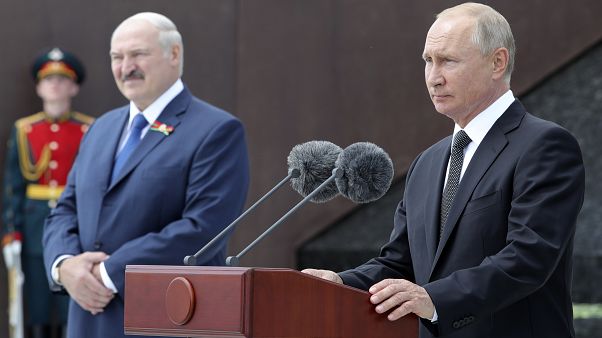
Russian President Vladimir Putin, right, and Belarusian President Alexander Lukashenko at public ceremony, in the village of Khoroshevo, Russia, 30, 2020 - Copyright Mikhail Klimentyev, Sputnik, Kremlin Pool Photo via AP
Belarusian president Alexander Lukashenko is flying to Sochi on Monday for a meeting with his Russian counterpart Vladimir Putin.
It comes after the sixth consecutive weekend of unrest in Belarus - with thousands of protesters demanding Lukashenko's resignation in Minsk, amid vote fraud allegations and hundreds of detentions.
The Belarusian leader hinted in an interview last week that should current protests in Belarus "succeed" in destabilising the political power, Russia would "come next", while Putin himself previously asserted he would be ready to deploy forces to Belarus to prevent the situation from spinning "out control".
According to Katsiaryna Shmatsina, a political Analyst at Belarusian Institute for Strategic Studies, Putin is aware that the current unrest in Belarus could have a domino effect on Russia.
Lukashenko goes to Russia: What the meeting of 'brothers' could mean for Belarus' future
"Putin himself understands that [... ] Belarus might set an example of a success story against authoritarian leadership", Shmatsina to Euronews' Good Morning Europe.
That however would not be enough to guarantee the efficacy of a Russian intervention, she explained.
"Russia has not so much support inside the Belarusian society, in terms of integration or some kind of annexation, or joining Russia."
"In this time when the Belarusian society is having this high momentum of protest potential, should Putin interfere in a sort of aggressive way, he would meet a huge pushback".
Nevertheless, Putin is prepared, according to Shmatsina, to seize the opportunity of this meeting to capitalize on Belarus' political unrest and keep Belarus "in its orbit for geopolitical interest".
Lukashenko goes to Russia: What the meeting of 'brothers' could mean for Belarus' future
David Walsh • last updated: 14/09/2020 - 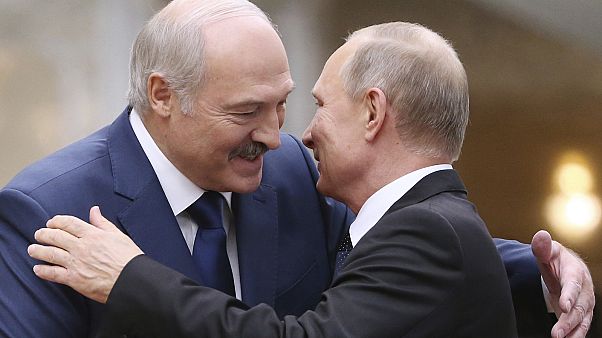
Belarusian President Alexander Lukashenko, left, greets Russian President Vladimir Putin - Copyright Tatyana Zenkovich/Associated PressThe writing may be on the wall for Belarusian opposition activists when the country's embattled president Alexander Lukashenko meets with Vladimir Putin, his Russian counterpart who he recently referred to as his "elder brother", in Sochi on Monday.
Riven by protests since the contentious presidential election on August 9, in which Lukashenko claimed a dubious landslide victory after nearly 30 years in power, the Eastern European country is facing an uncertain future.
Lukashenko's attempts to suppress protests and strikes in the wake of the election have so far only served to bolster opposition to his regime, forcing his hand to look to the Kremlin for support.
Could the meeting between these cautious allies help cement his grip on power in Belarus and finally take the wind out of the sails of those pushing for what opposition figurehead Sviatlana Tsikhanouskaya has called a "democratic revolution"?
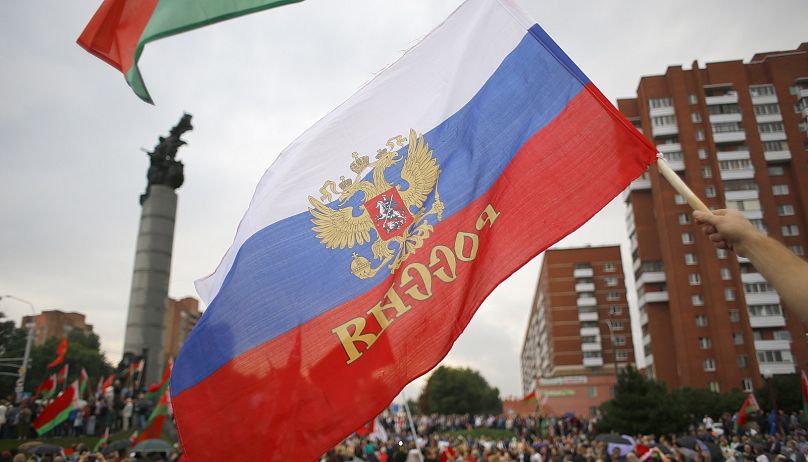 Pivot to the East
Pivot to the EastTraditionally, Lukashenko has navigated a tight course between the East and West, adjusting his heading tactically to sail closer to one or the other in order to leverage their support for his own benefit.
In the 23 years since he signed an agreement with Russia to integrate Belarus into a fiscal, political and economic union with its larger neighbour, Lukashenko has resisted attempts to fully acquiesce to Russian influence.
With instability rocking the current Belarusian regime to its foundations, Putin could finally have his chance to force Lukashenko to commit to the terms of the 1997 agreement and bring the country fully into Russia's orbit.
"This does present Putin with his best opportunity to pressure Lukashenko, as the latter is weak domestically and has also lost support from the West, so he cannot manoeuvre as he used to," Katia Glod, a Belarusian analyst and non-resident fellow at the Center for European Policy Analysis (CEPA), told Euronews.
A man waves a Russian national flag as supporters of Belarusian President Alexander Lukashenko rally in a square in Minsk, Belarus.Sergei Grits/Associated Press
"At the same time, I don't think that he (Lukashenko would be pushed into signing any significant treaties at this moment.
"The pressure from the Kremlin would be too obvious, whilst the Kremlin would like to play its cards quietly.
"This would trigger bigger protests in Belarus as the Kremlin's goal is to suppress them, and as Lukashenko is viewed as illegitimate domestically and in the West, his signature on any agreement would be questionable."
Putin, buoyed by a muted international response to Russia's annexation of Crimea in 2014, has become more confident in his foreign policy endeavours, including supporting pro-Russian separatists in Ukraine's Donbas region and intervening in the Syrian war.
"I don't think that the Kremlin will make a direct intervention, akin to the one in Crimea," says Glod. "It looks like a soft, creeping intervention that is already taking place, with the aim fo eventually controlling Lukashenka and the Belarusian government politically and economically but leaving the borders officially intact."
Belarus as a satellite state
If Lukashenko secures assurances from Putin and Russian support to quash opposition to his rule, it would be significant in shaping Belarus' future, not least by keeping him in power for the foreseeable future.
"If Lukashenko stays in power, the country may become, in the longer term, similar to Transnistria or Abkhazia - fully dependent economically or politically on Russia," says Glod. "The people of Belarus would not like this of course, and would be protesting, but here we are in unchartered territory."
Having broken away from Moldova and Georgia respectively, the two former Soviet entities Glod mentioned are nominally independent (albeit not recognised by the international community) but operate in Russia's military, political and economic spheres as de facto satellite states.
Even amongst Lukashenko's supporters, surrendering Belarus' independence in this way would be an unpalatable development. As Glod contends, there may still be a way forward that recognises Belarus' links to both East and West, so long as the opposition is successful in ousting Lukashenko's regime and avoiding a Russian puppet government.
"If the new government was chosen by the people of Belarus — in contrast to the Kremlin's engineered transition, whereby it will likely put someone very controllable by and amenable to Russia — it would keep the economic ties with Russia (40 per cent of Belarusian exports go to Russia), but would also try to expand the economic and political cooperation with the West," Glod says
Economic bonds hard to break
"If the new government were democratic, the relations with the West would improve tremendously, with the loans and investment flowing in too. The new government would likely try to strike a balance between the two powers, but, compared with the current very low base of cooperation with the West, it would be a very tangible improvement of ties."
Given its shared history as a Soviet republic and continuing reliance on Russia economically as the largest market for its export goods, any future government will need to follow Lukashenko's lead and strike a balance between East and West for the country to prosper. In effect, Russian influence is unlikely to fade in the near future if the spectre of Lukashenko's rule is finally exercised.
"The new government would, however, be very cautious about joining NATO not to upset Russia — so militarily Belarus would probably still keep its ties with Russia," says Glod.
"Economically, as Belarus is part of Russia-led Eurasian Economic Union, it would not be able to have a DFTA (free trade agreement) with the EU now or in the near future, but that should not be ruled out in a more distant future."
_CORRECTION: In an earlier version of this story we wrote that the meeting will take place in Moscow, which was incorrect, it is in fact taking place at the Black Sea resort of Sochi. We apologise for our error. _
Who is Nina Baginskaya, the 73-year-old Belarusian protester that takes on riot police?
By Emma Beswick • last updated: 13/09/2020 - 20:03
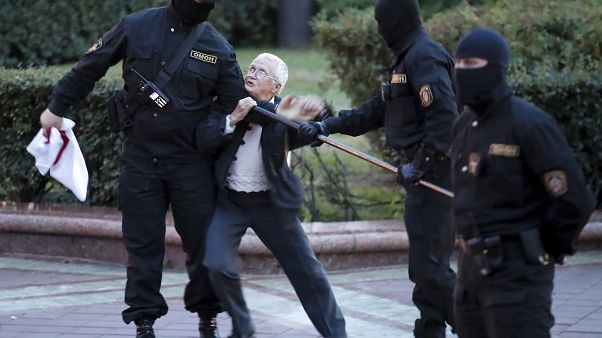
Opposition activist Nina Baginskaya, 73, struggles with police during a Belarusian opposition supporters' rally at Independence Square in Minsk, Belarus, Aug. 26, 2020. - Copyright Dmitri Lovetsky/Copyright 2020 The Associated Press. All rights reserved
As the women of Belarus' opposition take to the streets every Saturday in the wake of President Lukashenko's disputed election victory, one protester has become a key figure within the movement.
Nina Bahinskaya, 73, has been pictured at anti-government rallies since they kicked off, telling off police and at one point blocking one of the authorities' armoured vehicles by standing in front of it.
Video published on Nexta's Telegram channel showed the septuagenarian resisting arrest by police at the protest on September 12 and trying to remove one officer's balaclava.
The confrontation served to further raise her already-elevated profile and crowds could be heard chanting "Nina" as the event unfolded.
But this is nothing new for Bahinskaya — armed with the country's former red-and-white flag on a long pole, she has been demonstrating since long before Belarus' recent election.
The great-grandmother has appeared at demonstrations in the country since 1988, from demanding the arrest of political prisoners to protesting the demolition of a memorial site for the victims of Soviet-era mass executions.
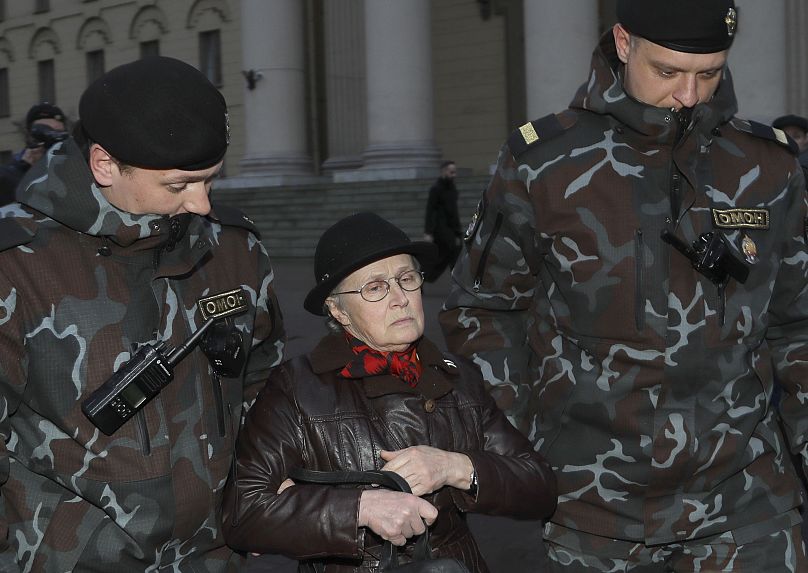 Police take Baginskaya away prior to a demonstration against the detention of four people for their attempt to protest political repression. Minsk, Belarus. March 31, 2017.Sergei Grits/AP
Police take Baginskaya away prior to a demonstration against the detention of four people for their attempt to protest political repression. Minsk, Belarus. March 31, 2017.Sergei Grits/AP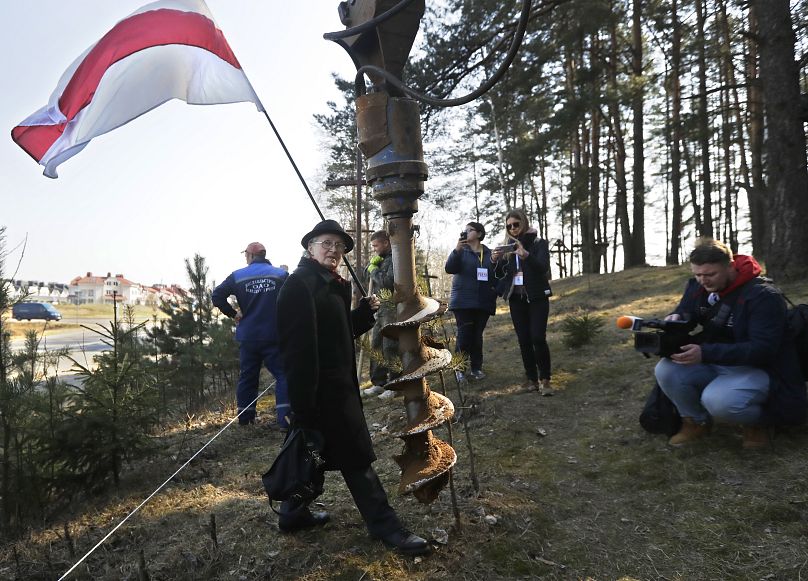
Baginskaya blocks a drill at the Kuropaty mass grave site of Soviet-era mass executions in the Belarus capital Minsk. April 5, 2019.Sergei Grits/AP
Police officers detain opposition activist Nina Baginskaya at the Kuropaty mass grave site of Soviet-era mass executions in the Belarus capital Minsk, Friday, April 5, 2019.Sergei Grits/AP
The flag, now banned in Belarus, has become popular among opposition protesters as an anti-Lukashenko symbol.
When riot police took Bahinskaya's flag after a march at the end of August, video captured her confronting the officer.
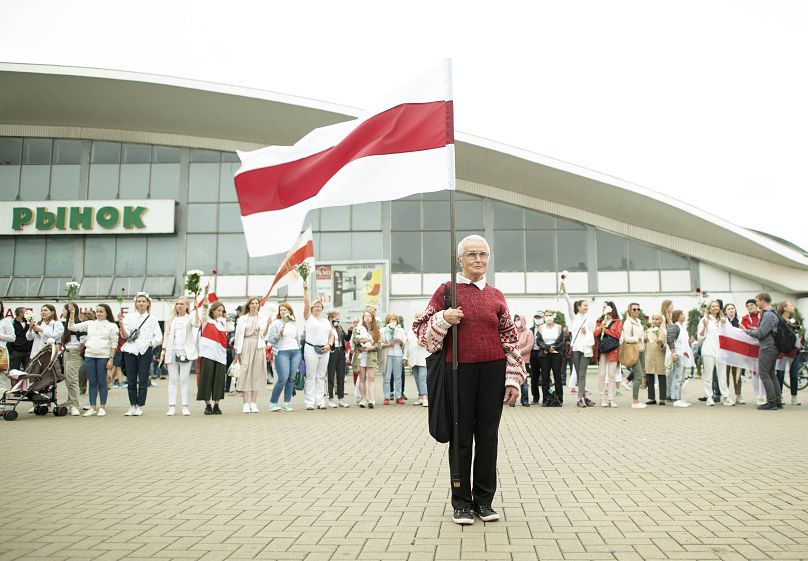
Braginskaya holds a former Belarus flag during a protest in Minsk, Belarus, Aug. 22, 2020.Evgeniy Maloletka/AP
Franak Viačorka, a journalist and analyst based in Minsk, Belarus, said on Twitter that protesters on September 13 informally named a square after Bahinskaya as part of an initiative which saw the opposition demonstrators assign names linked to the movement to squares and streets in the capital.
But not everyone is a fan of the 73-year-old and her tactics — in a recent report on her, the BBC pictured one woman on the sidelines of a protest shouting: "You found some half-mad babushka and you're following her."
As the unrest rages on in Belarus, the opposition's silver-haired celebrity has shown no sign of taking a step back from being at the centre of the movement.
Franak Viačorka, a journalist and analyst based in Minsk, Belarus, said on Twitter that protesters on September 13 informally named a square after Bahinskaya as part of an initiative which saw the opposition demonstrators assign names linked to the movement to squares and streets in the capital.
But not everyone is a fan of the 73-year-old and her tactics — in a recent report on her, the BBC pictured one woman on the sidelines of a protest shouting: "You found some half-mad babushka and you're following her."
As the unrest rages on in Belarus, the opposition's silver-haired celebrity has shown no sign of taking a step back from being at the centre of the movement.
'Tricks, truants and transsexuals': Lukashenko loyalists hit out over Belarus protests
By Linas Jegelevicius • last updated: 11/09/2020
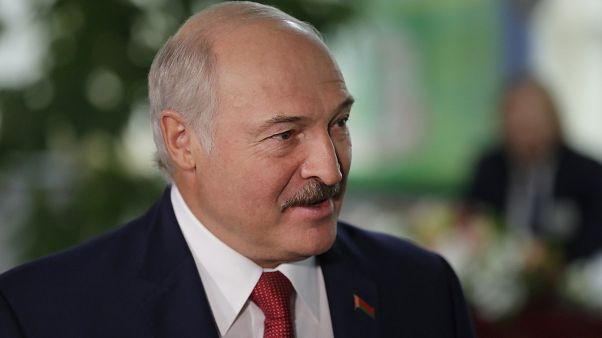
Belarusian President Alexander Lukashenko smiles after voting at a polling station during parliamentary elections, in Minsk, Belarus - Copyright Sergei Grits/Copyright 2019 The Associated Press. All rights reserved
The views of Belarus' opposition movement are well known: last month's presidential poll was rigged in Alexander Lukashenko's favour, he must step aside and free and fair elections should be held within six months.
But what about supporters of Lukashenko? Why are they backing him and what do they think about the demonstrations?
'Lukashenko cares about Belarusians'
For octogenarian Marina Anatoljevna Demjanina, from Grodno near the Polish border, Lukashenko is a pillar of Belarusian stability.
“Once it is broken, the rest tumbles down disastrously," she told Euronews. "When this happened in Ukraine, a war broke out there and the blood is being shed even now. Is that what our opposition people want?
“We all lived in fear under Stalin, but there was impeccable order and respect for order. Democracies are twisted and doomed. The people are much worse and much more selfish nowadays. Lukashenko does care about the Belarusians.
“It is far from the truth that only the elderly support Lukashenko. My grandsons, both in their twenties, also favour him, so far."
Lukashenko, 66, is the only president Belarus has ever known. Dubbed Europe's last dictator by his critics, he first came to power in 1994, three years after the former Soviet country declared independence.
But his grip on power has been shaken in recent weeks by a burgeoning opposition movement that has orchestrated regular anti-Lukashenko marches.
“Many people who support Lukashenko are frightened to speak out now and some are even fearful for their lives,” Demjanina claimed.
Viktor Mikhailovic Sevokhin, a veteran of the Afghanistan war, is not one of them.
“I am not afraid to admit that I am supporting our president (Lukashenko), despite the fact that he has shown some disrespect to veterans of the Afghanistan war," he said.
"A revolution – and this one ongoing these months in Belarus is no exception – is destructive.
"We may see the calmness and the relative wellbeing we’ve created under Lukashenko in tatters soon."
'Malicious truants'
Protests erupted after the August 9 poll, prompting a violent crackdown. In recent days key members of Belarus' opposition movement have been arrested or forced out of the country.
But Sevokhin has turned the finger of blame towards Lukashenko's critics, claiming they used "dirty tricks" to lure young people to protest.
"They massively, indiscriminately lured them and are still luring them to participate in the opposition rallies," said Sevokhin, who is based in the capital Minsk.
"The political wannabes netted them on social media, where the youth spends hours these days.
"Many of the children have never worked and many of them are malicious truants at their schools. But now they feel very important at the opposition-held rallies."
Nevertheless, Sevokhin admits he questions claims Lukashenko won 80% of the vote in the election and why the police were seemingly violent with the protesters.
But neither seem to affect his unswerving loyalty.
“Western values are already crippling societies," he continued. "And Lukashenko is the guarantor of our own Belarusian and Christian values.
"With Belarus being in the West, we will soon see transsexuals marching with their hands clasped in central Minsk.
“The syloviki (law enforcement) and veterans will stand behind “batjka” (Lukashenko's nickname, meaning “dad” diminutively) until our last gasp.”
Nikolaj Logvin, exiled in the Lithuanian port of Klaipeda but who goes back to Belarus regularly, has a more balanced view.
“The youth is for change, the elderly for Lukashenko, with some exceptions on both sides,” he said. “Most of them are wary of what happened in Ukraine, which still has not found peace within itself.
"It sad to see so much enmity and hostility across the ranks of a community, a workplace,” he added.
Logvin said his numerous relatives back home couldn’t have any complaints about their lives in Belarus.
“We all have problems. But my relatives had been leading quite a comfortable life until the recent political shake-up. I mean they had jobs, state-paid allowances, stipends, which were rising. Most importantly, we had stability.
“The opposition and the youth have only one goal – to depose the president (Lukashenko). But unfortunately, they haven’t laid out their vision, an economic plan how to move Belarus forward with Lukashenko out."
'Lukashenko's days are numbered'
So how much support does Lukashenko have in the country?
Belarusian political analyst Alyaksandr Klaskouski told Euronews that officials in the huge state apparatus, as well as the siloviki and their families, support him.
“Also the grandmas who spend their entire evenings watching state TV news," he added. "All in all, Lukashenko supporters must comprise 20-30 per cent, no more.
“So far, the siloviki are behind him, but erosion, however, has begun with some officials quitting their jobs in protest of the clamping down or siding with the opposition.
“I predict his chances of being in power at the new year as 50-50. But no one doubts, and perhaps he himself as well, that his days are numbered. It is just a matter of time until the regime collapses.”
Stun grenades, rubber bullets and secret service raids: What it's like reporting from Belarus
By Emil Filtenborg • last updated: 09/09/2020
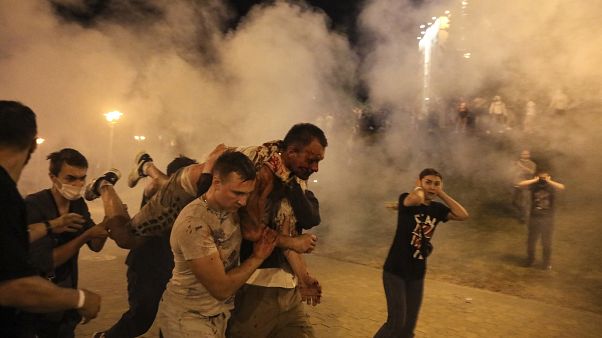
In this Aug. 10, 2020, file photo, protesters carry a wounded man during clashes with police after the presidential election in Minsk, Belarus. - Copyright AP Photo
One month on from the, now historic, disputed election of August 9 2020, Euronews asks Journalist Emil Filtenborg to tell the story of his and his colleague Stefan Weichert's reporting of what is now something the whole world is watching.
On the evening of August 9, I was running from riot police.
My colleague Stefan and me were in Belarus to cover the presidential elections for Euronews. Exit polls predicting a landslide victory for incumbent President Alexander Lukashenko had just been released prompting thousands to pour into the streets of capital Minsk in protest.
The authorities responded with a crackdown of unprecedented force.
August 9
That night, after dodging riot police for 20 minutes, we were pushed into a staircase leading to a backstreet. That is when we heard the first three stun grenades that kickstarted four days of violent crackdowns on peaceful protesters.
The grenades went off at the bottom of the staircase with a thundering crack that made our ears ring for minutes and impaired Stefan's vision for some time.
As the sound of police truncheons hammering down on protesters down on the main street reached us, we fled into a parallel street, following a group of panic eyed and disoriented protesters. Our priority was making it back to the demonstration so we could start interviewing people and get an overview of the events.
In pictures: The most striking images from Belarus protest
'Scores' detained as students in Belarus protest against President Lukashenko | #TheCube
We had people in place doing welfare checks, we did a risk assessment, and we had planned as best we could to find exit routes out of the protest. We had also prepared for violence from the authorities but we never expected it to be this brutal, this early.
Our plans of getting into the demonstration to secure information and interviews were thrown out the window after the flashbangs rang out. It was our second plan to be quickly derailed as we had initially hoped to follow a protester but we were barred from reaching his place by police.
Instead, we circled around for a while but eventually made it back to the protest by carefully avoiding empty main streets and areas with only one or two exit points.
Usually, we would have checked for information on Twitter, but the internet was down and so we were walking, virtually, blind.
When we finally made it back to where the main demonstration was taking place, a young woman — I doubt she was even 18 yet — tried to hug me when I introduced myself as a Danish journalist.
"Thank you for coming," she said with tears in her eyes. The gesture was interrupted, as people started running from a new push from the riot police.
We followed the protest for a couple of kilometres until a line of busses full of riot police separated us from the protestors. We decided to call it a night.
We sneaked back to the hotel, inconveniently located right where the protests started. We crossed the road, carefully avoiding a pool of blood on the pavement, and walked past two police officers assessing damage to the road. If they had asked for ID, we would most likely have been deported that night.
We slept for two hours and got up early to find a place with Wi-Fi to send our report.
Violence continues
The following two days, we didn’t go to the protests.
Every afternoon OMON (a Special Police Unit) would set up right outside the hotel, and walking out with a camera and two Danish passports would only have scored us a ride on the dreaded riot police busses.
We monitored the street from our hotel windows and we could see that although people could usually walk unhindered during the day, as the hours passed, OMON would start arresting people.
By then, protesters arrested that first night were starting to be released from detention centres and so we switched our focus to the victims of police violence.
Our first interview was a teenager who, upon being released from detention, find out that his parents had also been arrested as they were looking for him. We talked to the entire family when they were reunited. They were perfectly ordinary people who showed a touching degree of fortitude.
In Belarus, a family detained, separated and beaten by police is re-united
Stefan also visited a longtime activist, who had made it out of jail. She had just spent 30 days in solitary confinement under appalling conditions.
On the run: Activist recounts her experience of solitary confinement in Belarus
Beers, sandwiches and dirty underwear
Initially, the staff at our hotel were very forthcoming. Some even expressed gratitude because we were there to report on the events unfolding. However, three days after the election, the mood started to change.
Stefan received a call from reception, asking us to come down to settle the bill even though we were booked for three more nights. When we got down, the staff avoided eye contact.
When Stefan later went out to pick up dinner, he noticed a man with sunglasses talking to the hotel's two security guards. He immediately left out the front door when he saw my colleague, while the receptionist looked down at the desk.
Stefan had to go in the same direction as the unidentified man, who, upon passing a nearby café, nodded to another man sitting alone on the terrace prompting him to zero-in on Stefan.
EU announces sanctions against Belarus over 'violence' on protesters and electoral 'falsification'
Belarus deports several foreign journalists covering protests
Soon after, Stefan called me to warn me that something was wrong. I didn’t fully understand why he was so sure, but I know my colleague well enough to trust him in these situations.
Stefan proceeded as if nothing was the matter while I started packing. On his return trip, the man at the café immediately placed a call upon seeing him, and so minutes after Stefan had reached the hotel, we left out of the back entrance.
The next day, the Belarus secret service started raiding hotels downtown and even arresting some journalists. If they had raided our hotel, all they would have found were beer cans, uneaten sandwiches and dirty underwear.
Goodbye, Minsk
With our editor, we decided that it was time for us to leave. We went to the airport on Thursday night, five days after the election. Stefan kept saying it was a mistake, and I kept asking him to shut up because I knew he was right. At the time, it looked like Lukashenko might fall at any minute.
As I was following the news on Twitter and Telegram, I kept thinking of the young girl thanking me for being there.
I called Stefan and asked if he had any plans the following day. He said no. I asked if he wanted to take a short trip to Belarus. He said yes. We booked a flight for Minsk and landed in the morning after 36 hours or so back home.
This time we moved to an apartment instead of a hotel. We continued working with a mix of reports from the protests that had now turned less violent and interviews with people ranging from volunteers teaching protesters first aid to state-employed journalists leaving their jobs.
'They were beating people severely': Teenager relives detention in Belarus
On the run: Activist recounts her experience of solitary confinement in Belarus
On Sunday, the day after we entered the country a second time, we went to a protest at the location where it all began. Around 200,000 people showed up in the most massive demonstration the country had ever seen.
Though still fearful, the mood was hopeful, almost festive. It was surreal to think that this happened only a week after the election day protests. Nothing and everything had simultaneously changed.
On edge
We were already on edge after what we figured to be a close call in the hotel. When we saw someone running for the bus or heard a balloon pop, our first instinct was to flee. The stun grenades and the rubber bullets, for me at least, are not the worst part — it is the constant being on guard that drains you.
We were not the only ones being a bit jumpy. A lot of the sources we spoke to wanted anonymity, which we often agreed on. We were writing all our articles without putting our names on them because we did not want the attention.
The Belarusians we spoke to risked detention and the beatings that often came with it. In extreme cases, they took serious risks by speaking with us.
Being a journalist Belarus is not safe, but it is undeniably a lot safer than being an ordinary citizen.
While I appreciate the opportunity to provide an account of what working in situations like this is like, I find it necessary to stress that journalists can go home and regroup when we lose sight of things. The Belarusians can’t.
Belarus: Unfinished Revolution
By Anelise Borges • last updated: 10/09/2020
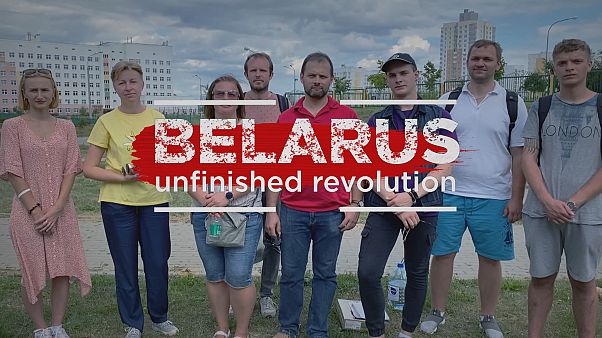
euronews - Copyright
On August 9th, Belarus held presidential elections that were set to change the course of politics in the country.
An unprecedented opposition movement had been gaining support and gathering tens of thousands of people in weekly rallies called by candidate Sviatlana Tikhanouskaya.
A trained translator turned presidential hopeful, Tikhanouskaya used to say, if elected, she would not stay at the job too long - her project was to free political prisoners (her husband included) and put in place conditions for free and fair elections to be held.
But her project has yet to see the light of day. Belarus’ election commission say Tikhanouskaya won a mere 10.12% of the vote, something her teams (and a large number of voters in the country) dispute.
“Belarus: Unfinished Revolution” tells the story of a grassroots political movement that represents the biggest challenge faced by the regime of President Alexander Lukashenko in the nearly 30 years he’s been in power.
This short piece is a collection of individual stories - a look at what brought people to the streets and drives them to continue protesting one month on despite the crackdown and the intimidation.
It’s about ordinary people doing extraordinary things.
No comments:
Post a Comment